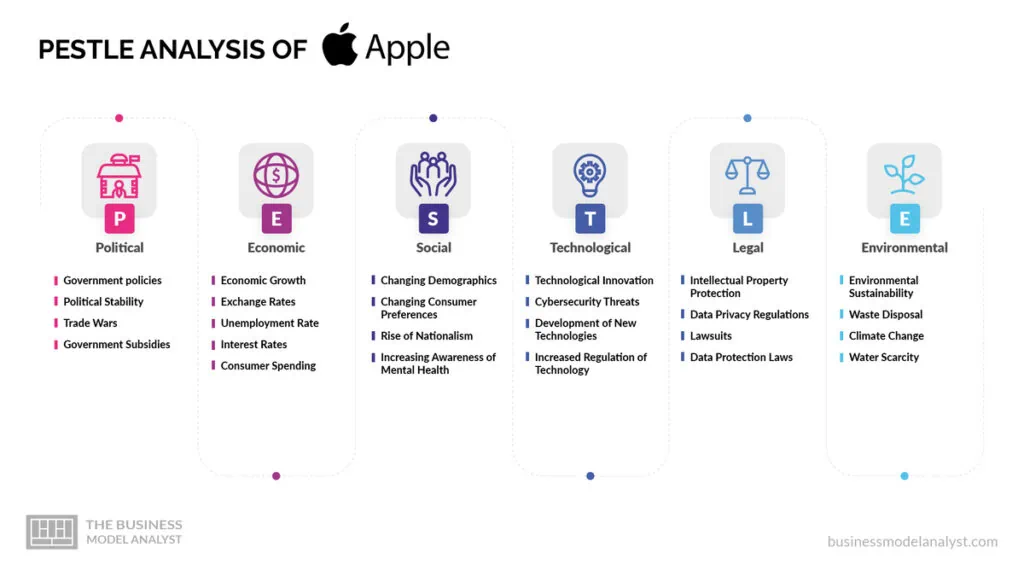Apple PESTLE Analysis: Apple is one of the most successful companies in the world, but it is not immune to the forces of the external environment. In this article, we will conduct a PESTLE analysis of Apple to identify the key political, economic, social, technological, environmental, and legal factors that could impact the company’s future.
The PESTLE analysis is a strategic tool that can help businesses identify and manage risks and opportunities. By understanding the external environment, businesses can make better decisions about where to allocate resources and how to position themselves for future growth.
Contents
Apple Political Factors
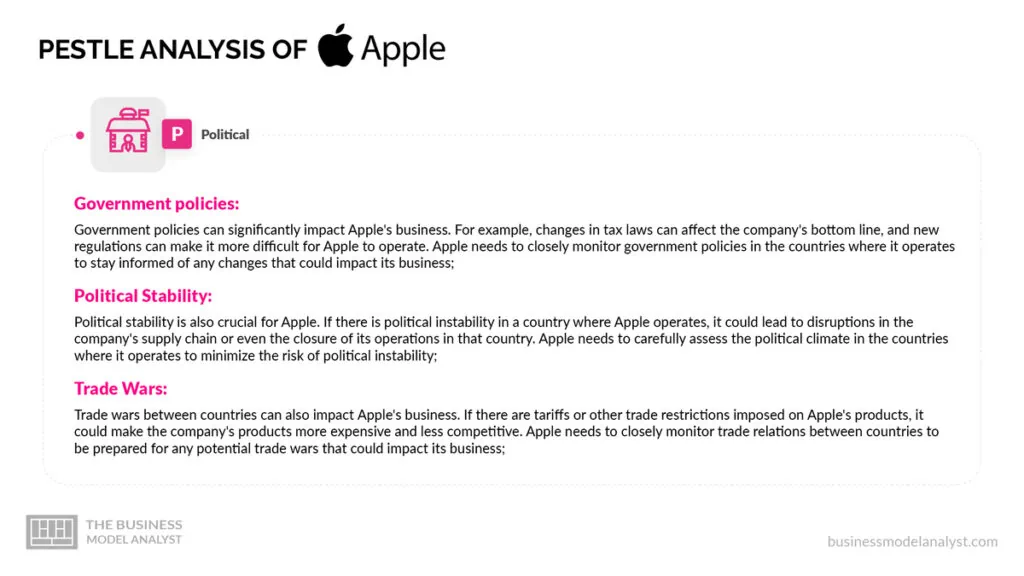
Apple is subject to government policies in the countries where it operates. These policies can impact the company’s business in several ways, such as through taxes, regulations, and trade restrictions.
- Government Policies: Government policies can significantly impact Apple’s business. For example, changes in tax laws can affect the company’s bottom line, and new regulations can make it more difficult for Apple to operate. Apple needs to closely monitor government policies in the countries where it operates to stay informed of any changes that could impact its business;
- Political Stability: Political stability is also crucial for Apple. If there is political instability in a country where Apple operates, it could lead to disruptions in the company’s supply chain or even the closure of its operations in that country. Apple needs to carefully assess the political climate in the countries where it operates to minimize the risk of political instability;
- Trade Wars: Trade wars between countries can also impact Apple’s business. If there are tariffs or other trade restrictions imposed on Apple’s products, it could make the company’s products more expensive and less competitive. Apple needs to closely monitor trade relations between countries to be prepared for any potential trade wars that could impact its business;
- Government Subsidies: Government subsidies to competitors can also give Apple’s competitors an unfair advantage. For example, if a government subsidizes the production of smartphones by a competitor, it could make those smartphones more affordable and competitive. Apple needs to be aware of government subsidies to competitors to ensure it is not at a competitive disadvantage. Obviously, this can also work in the other direction too.
In addition to these four factors, many other political factors could impact Apple’s business. Here are some additional points that could be included in the expanded text:
- The importance of lobbying and political donations for Apple;
- The potential impact of changes in the global political landscape, such as the rise of populism or nationalism;
- The risks associated with operating in countries with authoritarian governments;
- The opportunities that could arise from new government policies, such as those that promote innovation or sustainability;
- Changes in intellectual property laws could make it more difficult for Apple to protect its patents and trademarks;
- Apple also needs to be aware of the potential for political boycotts of its products in certain countries.
Apple Economic Factors
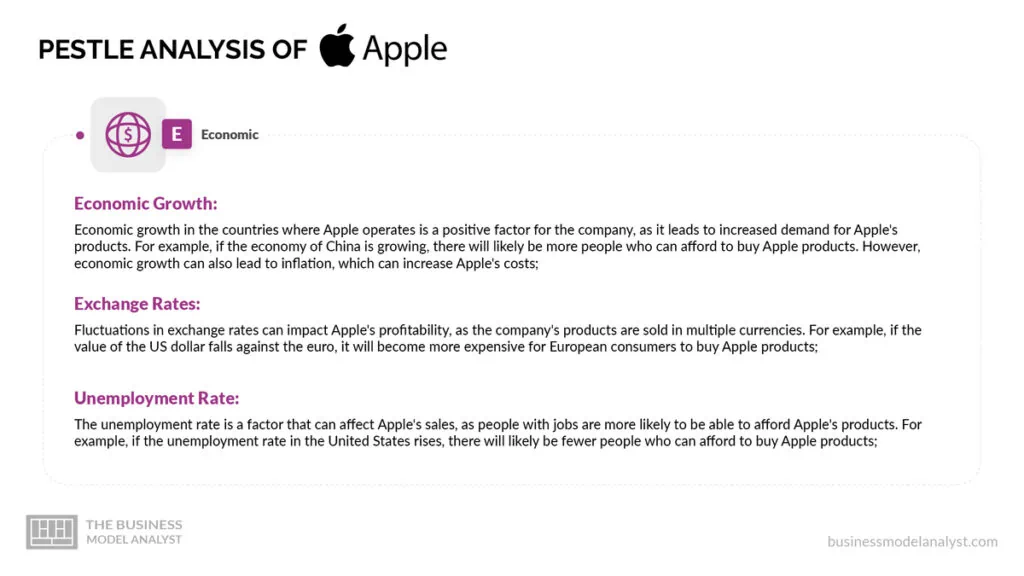
Apple’s business is heavily influenced by economic factors, both at the global and local levels. The following are some of the most important economic factors that can impact Apple’s business:
- Economic Growth: Economic growth in the countries where Apple operates is a positive factor for the company, as it leads to increased demand for Apple’s products. For example, if the economy of China is growing, there will likely be more people who can afford to buy Apple products. However, economic growth can also lead to inflation, which can increase Apple’s costs;
- Exchange Rates: Fluctuations in exchange rates can impact Apple’s profitability, as the company’s products are sold in multiple currencies. For example, if the value of the US dollar falls against the euro, it will become more expensive for European consumers to buy Apple products;
- Unemployment Rate: The unemployment rate is a factor that can affect Apple’s sales, as people with jobs are more likely to be able to afford Apple’s products. For example, if the unemployment rate in the United States rises, there will likely be fewer people who can afford to buy Apple products;
- Interest Rates: Changes in interest rates can impact Apple’s business, as the company borrows money to finance its operations. For example, if interest rates rise, it will become more expensive for Apple to borrow money, which could impact the company’s profitability;
- Consumer Spending: Consumer spending is a key driver of economic growth, and a slowdown in consumer spending can impact Apple’s sales. For example, if consumer spending in the United States slows down, Apple’s sales will likely slow down.
In addition to these five factors, several other economic factors could impact Apple’s business.
- The importance of economic forecasting for Apple;
- The risks associated with operating in countries with volatile economies;
- The opportunities could arise from new economic policies, such as those promoting free trade or innovation;
- Changes in government spending could affect the demand for Apple’s products;
- Apple also needs to be aware of the potential for economic recessions, which could significantly impact the company’s business.
Apple Social Factors
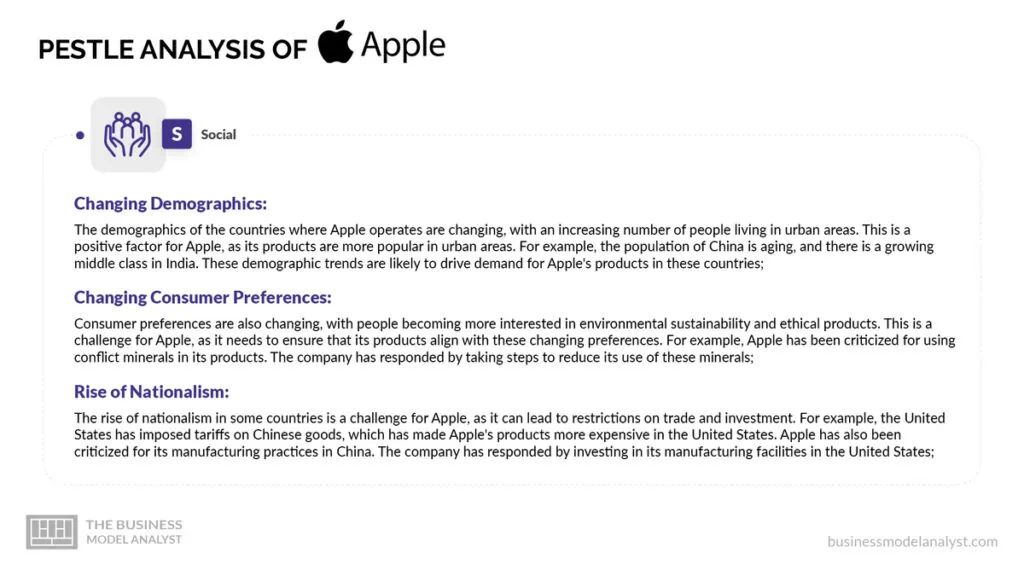
Several social factors, including changing demographics, consumer preferences, and the rise of nationalism, influence Apple’s business.
- Changing Demographics: The demographics of the countries where Apple operates are changing, with an increasing number of people living in urban areas. This is a positive factor for Apple, as its products are more popular in urban areas. For example, the population of China is aging, and there is a growing middle class in India. These demographic trends are likely to drive demand for Apple’s products in these countries;
- Changing Consumer Preferences: Consumer preferences are also changing, with people becoming more interested in environmental sustainability and ethical products. This is a challenge for Apple, as it needs to ensure that its products align with these changing preferences. For example, Apple has been criticized for using conflict minerals in its products. The company has responded by taking steps to reduce its use of these minerals;
- Rise of Nationalism: The rise of nationalism in some countries is a challenge for Apple, as it can lead to restrictions on trade and investment. For example, the United States has imposed tariffs on Chinese goods, which has made Apple’s products more expensive in the United States. Apple has also been criticized for its manufacturing practices in China. The company has responded by investing in its manufacturing facilities in the United States;
- Increasing Awareness of Mental Health: Increasing awareness of mental health is a challenge for Apple, as it needs to ensure that its products are not contributing to mental health problems. For example, there have been concerns that using social media can lead to depression and anxiety. Apple has responded by introducing features in its products that are designed to promote mental health, such as the Screen Time feature.
There are a number of other social factors that could impact Apple’s business.
- For example, changes in how people communicate could affect the demand for Apple’s products;
- Apple also needs to be aware of the potential for social unrest, which could disrupt its business operations;
- The importance of social media for Apple;
- The risks associated with operating in countries with repressive governments;
- The opportunities that could arise from new social movements, such as those that promote environmentalism or social justice.
Apple Technological Factors
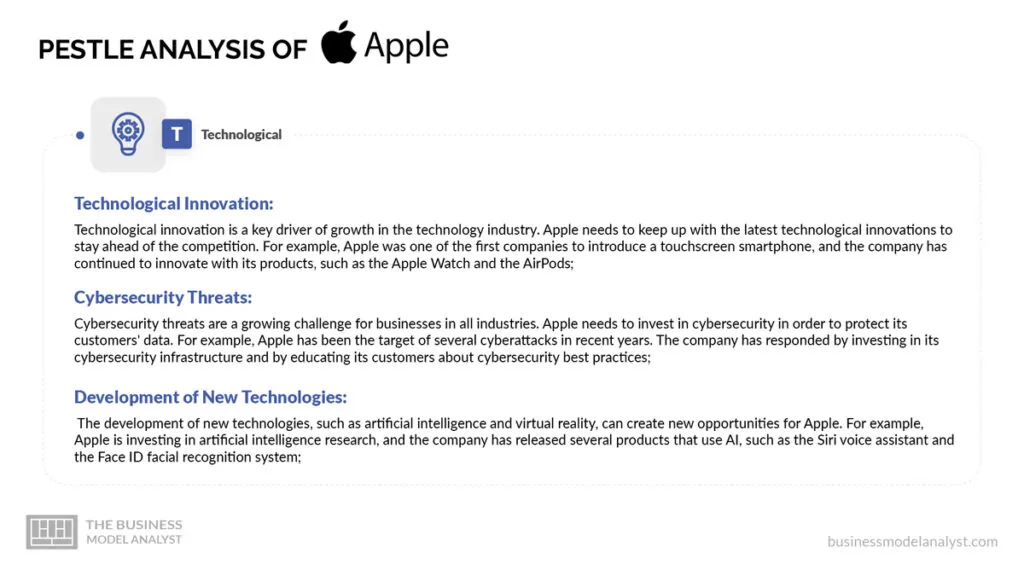
Technological factors heavily influence Apple’s business, as the company is a significant player in the technology industry. The following are some of the most important technological factors that can impact Apple’s business:
- Technological Innovation: Technological innovation is a key driver of growth in the technology industry. Apple needs to keep up with the latest technological innovations to stay ahead of the competition. For example, Apple was one of the first companies to introduce a touchscreen smartphone, and the company has continued to innovate with its products, such as the Apple Watch and the AirPods;
- Cybersecurity Threats: Cybersecurity threats are a growing challenge for businesses in all industries. Apple needs to invest in cybersecurity in order to protect its customers’ data. For example, Apple has been the target of several cyberattacks in recent years. The company has responded by investing in its cybersecurity infrastructure and by educating its customers about cybersecurity best practices;
- Development of New Technologies: The development of new technologies, such as artificial intelligence and virtual reality, can create new opportunities for Apple. For example, Apple is investing in artificial intelligence research, and the company has released several products that use AI, such as the Siri voice assistant and the Face ID facial recognition system;
- Increased Regulation of Technology: Increased regulation of technology is a challenge for Apple, as it can make it more difficult for the company to innovate. For example, the European Union has recently passed a law that requires companies to obtain consent from users before collecting their personal data. Apple has responded by updating its privacy policies to comply with the new law.
Here are a few additional factors that could impact Apple’s business.
- Changes in how people use technology could affect the demand for Apple’s products;
- Apple also needs to be aware of the potential for technological disruptions, such as the rise of quantum computing;
- The importance of Apple’s own research and development (R&D) efforts;
- The risks associated with relying on third-party suppliers for technology;
- The opportunities that could arise from new partnerships with technology companies.
Apple Legislative Factors
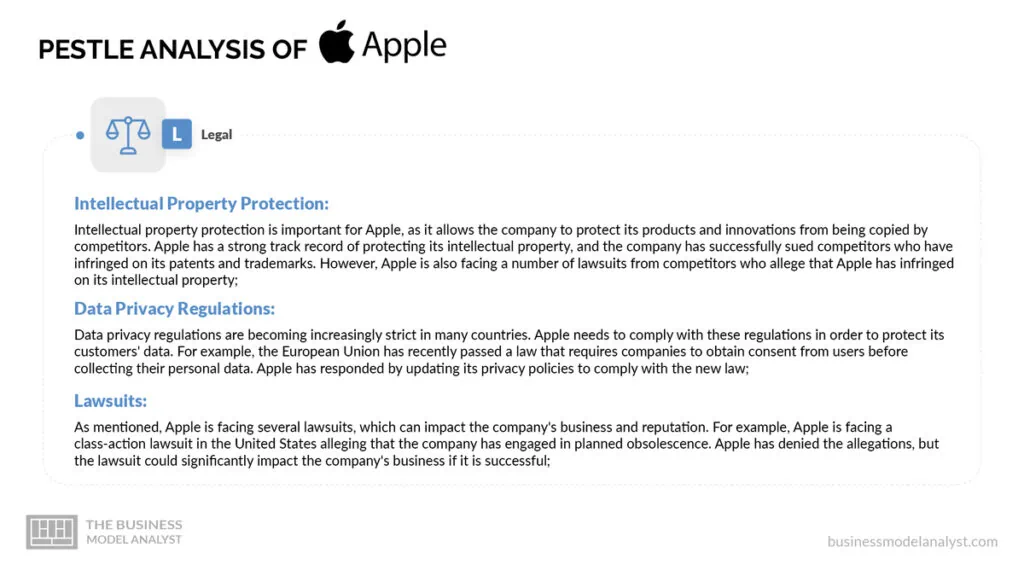
Legal factors heavily influence Apple’s business, as the company is a global company with operations in many countries. The following are some of the most important legal factors that can impact Apple’s business:
- Intellectual Property Protection: Intellectual property protection is important for Apple, as it allows the company to protect its products and innovations from being copied by competitors. Apple has a strong track record of protecting its intellectual property, and the company has successfully sued competitors who have infringed on its patents and trademarks. However, Apple is also facing a number of lawsuits from competitors who allege that Apple has infringed on its intellectual property;
- Data Privacy Regulations: Data privacy regulations are becoming increasingly strict in many countries. Apple needs to comply with these regulations in order to protect its customers’ data. For example, the European Union has recently passed a law that requires companies to obtain consent from users before collecting their personal data. Apple has responded by updating its privacy policies to comply with the new law;
- Lawsuits: As mentioned, Apple is facing several lawsuits, which can impact the company’s business and reputation. For example, Apple is facing a class-action lawsuit in the United States alleging that the company has engaged in planned obsolescence. Apple has denied the allegations, but the lawsuit could significantly impact the company’s business if it is successful;
- Data Protection Laws: Data protection laws are becoming increasingly strict in many countries. Apple needs to comply with these regulations in order to protect its ability to collect and use customer data. For example, the European Union has recently passed a law that gives users more control over their personal data. Apple has responded by updating its privacy policies to comply with the new law.
In addition to these four factors, there are a number of other legal factors that could impact Apple’s business.
- Changes in the legal landscape could make it more difficult for Apple to operate in certain countries;
- Apple also needs to be aware of the potential for legal challenges from governments or regulators;
- The importance of Apple’s own legal team;
- The risks associated with operating in countries with weak legal systems;
- The opportunities could arise from new legal developments, such as harmonizing data privacy laws across countries.
Apple Environmental Factors
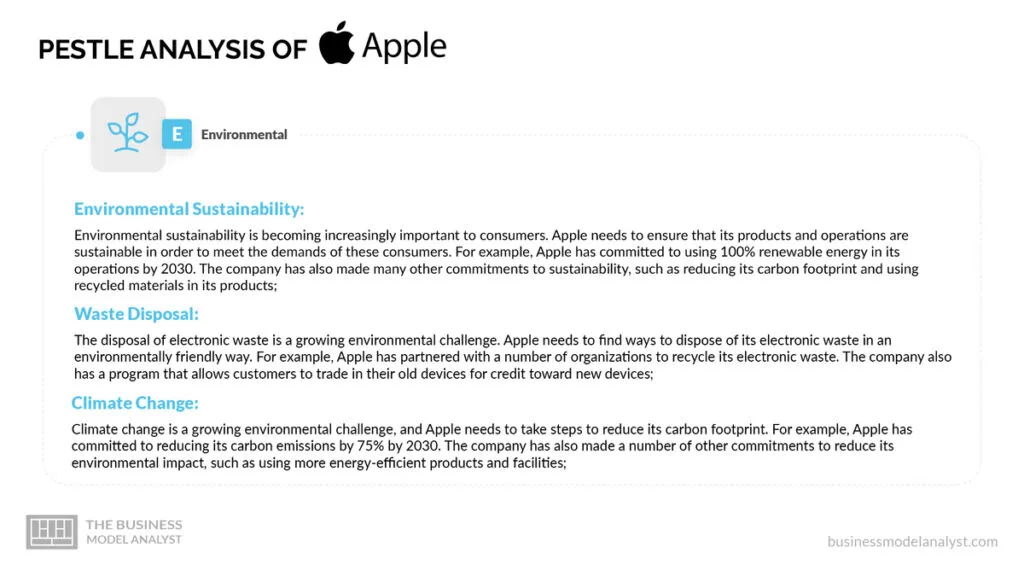
Environmental factors heavily influence Apple’s business, as the company is a major consumer of resources and a producer of waste. The following are some of the most important environmental factors that can impact Apple’s business:
- Environmental Sustainability: Environmental sustainability is becoming increasingly important to consumers. Apple needs to ensure that its products and operations are sustainable in order to meet the demands of these consumers. For example, Apple has committed to using 100% renewable energy in its operations by 2030. The company has also made many other commitments to sustainability, such as reducing its carbon footprint and using recycled materials in its products;
- Waste Disposal: The disposal of electronic waste is a growing environmental challenge. Apple needs to find ways to dispose of its electronic waste in an environmentally friendly way. For example, Apple has partnered with a number of organizations to recycle its electronic waste. The company also has a program that allows customers to trade in their old devices for credit toward new devices;
- Climate Change: Climate change is a growing environmental challenge, and Apple needs to take steps to reduce its carbon footprint. For example, Apple has committed to reducing its carbon emissions by 75% by 2030. The company has also made a number of other commitments to reduce its environmental impact, such as using more energy-efficient products and facilities;
- Water Scarcity: Water scarcity is a growing problem in some parts of the world, and Apple needs to ensure that its operations do not contribute to water scarcity. For example, Apple has committed to using water responsibly in its operations. The company has also made a number of other commitments to water conservation, such as installing water-efficient fixtures in its facilities.
In addition to these four factors, there are a number of other environmental factors that could impact Apple’s business.
- Changes in environmental regulations could make it more difficult for Apple to operate;
- Apple also needs to be aware of the potential for environmental disasters, such as floods or wildfires, which could disrupt its business operations;
- The importance of Apple’s own environmental sustainability team;
- The risks associated with operating in countries with weak environmental regulations;
- The opportunities that could arise from new environmental technologies, such as renewable energy.
Conclusion
In conclusion, the PESTLE analysis is a valuable tool for businesses that want to understand the external environment and identify risks and opportunities. In the case of Apple, the analysis reveals a number of both opportunities and challenges. By understanding these factors, Apple can make informed decisions about how to navigate the changing landscape and maintain its position as a global leader.


